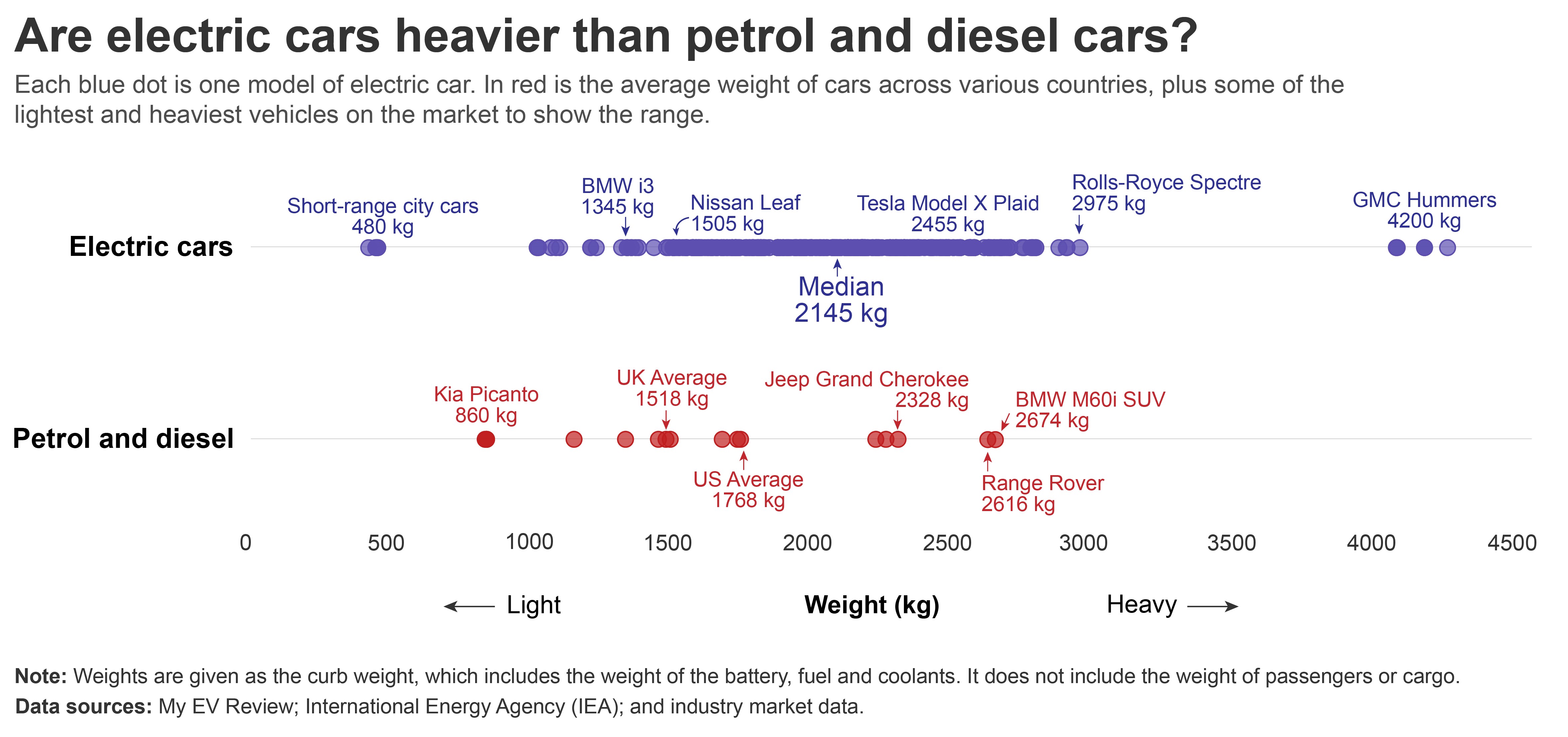Electric vehicles (EVs) have surged in popularity, lauded for their efficiency and reduced carbon footprint compared to traditional petrol or diesel cars. While advancements in range, affordability, and technology are frequently discussed, one aspect often debated is their weight. Concerns are raised about electric cars being significantly heavier, leading to worries about infrastructure strain and overall vehicle efficiency.
But how heavy are electric cars really? Is the perception of excessive weight justified, and how does it compare to conventional cars, especially with the growing prevalence of SUVs? Let’s delve into the data to understand the weight of electric vehicles and put these concerns into perspective.
Electric Car Weight Compared to Petrol Cars and SUVs
To gain a comprehensive understanding, we need to look beyond just averages and examine the entire spectrum of vehicle weights. While average figures provide a general idea, it’s crucial to know the range, from the lightest to the heaviest EVs, and how they stack up against their gasoline counterparts.
The chart below visualizes the weight distribution of 355 electric car models sourced from the My EV Review database. Each dot represents a distinct car model, arranged from lightest to heaviest.
Explore the interactive version
Analyzing this data, the median weight for an electric car is approximately 2145 kilograms, with a very similar mean weight of 2133 kg. However, the chart clearly illustrates a wide range in EV weights. At the heavier end, models like the GMC Hummer EV reach a substantial 4200 kilograms. Conversely, at the lighter end, compact city EVs weigh under 500 kilograms, resembling smaller vehicles designed for urban environments.
To contextualize these figures, let’s compare them with petrol and diesel cars. The red markers in the chart represent the average weights of cars in various countries, along with some of the lightest and heaviest gasoline cars for reference. The average car in the UK weighs around 1500 kilograms, while in the US, where larger vehicles are more common, the average is closer to 1800 kilograms. Both figures are lower than the average weight of electric cars.
This comparison leads to a clear conclusion: on average, electric cars are heavier than their gasoline counterparts. For countries like the UK, France, and Germany, the weight difference can exceed half a tonne.
Interestingly, despite being heavier than average petrol cars, electric cars tend to be lighter than many SUVs. While a Range Rover can weigh over 2200 kg and a BMW M60i approaches 2700 kg, numerous EVs fall within or even exceed this weight range.
Key takeaways from this weight comparison include:
- Electric cars, on average, are heavier than average petrol or diesel cars.
- A widespread shift to EVs would result in heavier vehicles on roads overall.
- Average electric cars are generally lighter than many gasoline SUVs.
- Electric SUVs can easily match or surpass the weight of gasoline SUVs.
- The weight distribution of electric car models is skewed towards the heavier end, with only a small percentage weighing less than the average UK car.
The Trend of Increasing Electric Car Weight
Vehicle weights, in general, have been increasing globally over time. Electric cars are no exception to this trend. Data from Norway, a leading market for EV adoption, illustrates this point. Research by Robbie Andrew shows the evolution of new car weights in Norway.
Early electric vehicles, often characterized by limited range and lower popularity, weighed around 1000 kilograms. A significant weight increase occurred with the introduction of the Nissan LEAF. Since then, the average weight of EVs has consistently risen year after year.
Source: Robbie Andrew
The data reveals that the average petrol or diesel car weighs approximately 1600 kilograms, while the average electric car is closer to 2000 kilograms. While petrol car weights have been gradually increasing, electric vehicles have experienced a faster rate of weight gain.
The primary contributor to this increased weight in electric cars is the battery pack. EV batteries are substantial components, adding considerable weight to the vehicle. The size and capacity of these batteries, directly influencing the vehicle’s range, play a significant role in the overall weight.
Electric Car Weight Statistics
For a more detailed statistical overview, the table below compares data from two independent databases, My EV Review and EV Database, regarding electric car weights:
The data from both sources aligns closely, reinforcing the observation that the average and median weights of electric cars are quite similar, hovering around the 2100-2150 kg mark.
In conclusion, electric cars are indeed heavier than traditional petrol or diesel cars on average, primarily due to the weight of their battery packs. While concerns about infrastructure impact are present, it’s important to note that EVs are often lighter than large SUVs. The trend of increasing EV weight is evident, driven by the demand for longer ranges and larger battery capacities.
To understand more about why electric cars are heavier and whether this is an unavoidable aspect of EV technology, continue reading part two of this analysis.
<span>Read Part Two of this two-parter </span><strong><a href="https://www.sustainabilitybynumbers.com/p/weighty-issue-of-electric-cars-two" rel="">here</a></strong><span>.</span>Subscribe to get new posts in your inbox.


